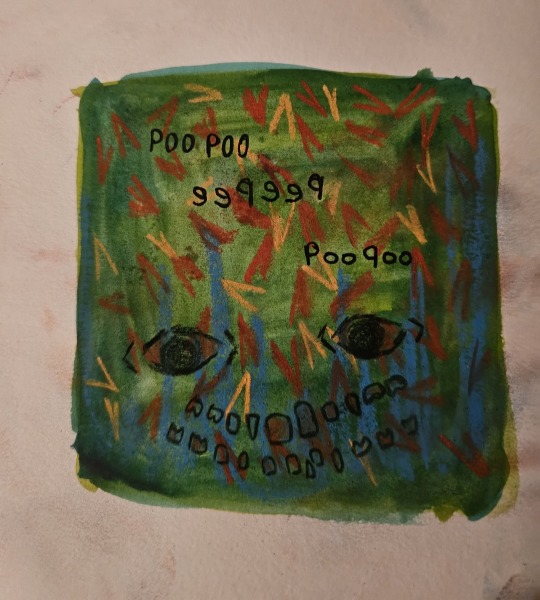#emotivism
Text
“New” Age of the Culture Wars: New Paint, Same Shit.
A night of blaze
Red, a harvest of
Our Hells, a sun
Setting somewhere yet
Nowhere, of earthly senses
A moon blue as crystal,
As diamonds, shimmering
Against the dark hues
A family of outcasts taking
Cues, smoking & caffeinating
To the melancholy of a new future
A fake future, accepting and warping
Paint suffering with brushstrokes
Of rivaled agitations, of which
The popular populous smile rainbows,
Of contaminants, drowning even their
Fraternities and sororities, schooled
Yet not intelligible, among yet
Another faction, as reactionary and irate
Solving nothing, new and running cowardly to
A comfortable security with of their own
Familiarity. Relativity in action.
0 notes
Text

RAPTURE (2024)
opacity | telegram | behance | vimeo | youtube
#animation#art#digital art#abstract#abstract art#graphic#graphics#sci-fi#high tech#acid#magic#liquid#bio#virus#motion graphics#installaction#emotiv#epoc#light installation#av#av installation#gridlcok#formless#idm#electronic#35mm#film#rapture
87 notes
·
View notes
Note
In order that no one is more than 1/4 mile from a grocery store, you'd need 8 grocery stores per square mile. That's assuming you place them with maximum efficiency though, so it would more likely take at least 10. Very few places in the US have a population density over 10k per square mile. So they're expecting grocery stores to be able to survive with at most 1000 regular customers? Insane.
(re)
See, you're looking at implications of statements, and second-order consequences, and numeracy, and expecting words to have specific meaning.
Call me cynical, but I think those people writing about food deserts in Baltimore aren't doing that. When they say it's a food desert if the nearest supermarket or alternative is more than 1/4 mile away, I think what they mean is something like "Close supermarket good. Far supermarket bad." and the number is fake precision because they picked up the vibe that numbers make statements look more authoritative.
58 notes
·
View notes
Text
Something that's amusing to think about: Gerard Way hated when MCR were called emo. Older people would often be livid if someone called MCR emo because they weren't real emo. Yet, MCR's debut album has everything going for it to have been an iconic as fuck emo album if it had dropped in the mid-late 80s before the commercialized evolution of the genre throughout the 90s.
29 notes
·
View notes
Text



5am arts n crafts
1 note
·
View note
Text
Urban Playground 101
The forefathers, are my mentors. For who & what this, is all that can be. No playing around, that I'm a player.

Los antepasados son mis mentores. Quién y qué es esto, es todo lo que puede ser. No hay que jugar con que soy un jugador. Elige sabiamente.
#urban playground 101#artificial intelligence#AI#para-professional#Edward Jenner#Sigmond Freud#emotiv
0 notes
Text
watched the ghost of you music video for the first time what the fuck
#LISTEN ok..#ive liked them for i while just ivenever had th emotivation to watch all the music videos#WHAT THE FUCK#WHAT THE ACTUAL#OH MY GOD
1 note
·
View note
Link
TEDにて
タン・レイ :脳波で動作するヘッドセットインターフェイス
(詳しくご覧になりたい場合は上記リンクからどうぞ)
タン・レイの紹介するビックリするような新しいコンピューターインターフェースは、ユーザーの脳波を読み取り、仮想的なオブジェクトや実際のスマート家電機器を念じるだけで(それと少しばかりの集中によって)操作することができます。
実現可能な未来のインターフェイスです!我々の脳は、ニューロンのネットワークがあるが、表面のしわが個人毎に異なるので電気信号を読み取り、電極でパターンをとらえるにはアルゴリズムの構築が不可欠でした。
タン・レイが、エヴァン•グラントに装着させてこのヘッドセットのデモを披露し、いろいろな応用例を紹介します。
データが少ないので多少時間と覚え込ませる過程が必要ですが、クラウドコンピューティングによる音声認識技術と同じ構築方法であらゆるパターン認識スピードを高速化できるかもしれません。
これまでの私達の機械に対するコミュニケーションは、意識的で直接的なものに限られていました。
スイッチで電灯を点けるという単純なことから、ロボティクスのプログラミングのような複雑なものまで機械に何かをさせようと思ったら、はっきりと命じたり一連のコマンドを与える必要がありました。
一方で、人と人のコミュニケーションは、ずっと複雑でずっと興味深いものです。明示的には示されない多くのことが考慮されるからです。
表情やボディランゲージを読むことで、会話しながら気持ちや感情を直感的につかみ取ることができます。実際、これは私達の意志決定に��いて大きな部分を占めています。
私達がビジョンに掲げているのは、人とコンピューターの対話の中に今までにはなかった人の対話の要素を導入することで、コンピューターが直接命令されたことだけでなく、人の表情や感情にも反応できるようにすることです。
そのための方法として、私達の制御や体験の中心にある脳が作り出す信号を解釈するより良い方法はないでしょう。
これはとても良いアイデアに見えますが、ブルーノも紹介してくれたように2つの理由により、容易なことではないのです。第一の問題は、検出アルゴリズムです。
私達の脳には、活動状態のニューロンが何��億もあり、軸索を繋ぎ合わせると17万キロにも及びます。
これらのニューロンが情報を伝えるとき、化学反応が起こす電気信号を計測することができます。脳の機能部位の大部分は、脳の表層部分にあります。
そして、知的能力に使える領域を増やすために、脳の表面にはたくさんの皺(しわ)があります。この皮質にある皺(しわ)のために、脳表層の電気信号の解釈は難しい問題となっています。
皮質の皺(しわ)の入り方は、指紋のように個人ごとに異なっているのです。
だから、信号が脳の同じ機能部��から来ているにしても、この皺になった構造のために、物理的な位置が個人ごとに大きく異なり、たとえ、一卵性双生児でも同じにはなりません。表層の信号に一貫した解釈はできないのです。
私達は、この問題の解決のため、皮質の皺を展開するアルゴリズムを作りました。それによって、信号をその発生元に対応づけることが可能になり、多くの人に適用できるようになったのです。
もう1つの難問は、脳波を観察するための装置です。脳波測定には、通常、センサーが並んだヘアネットのようなものを使います。
写真でご覧頂いているようなものです。その電極を技師が伝導性のジェルやペーストを使って、頭皮に取り付けるのですが、これをやると、あとで軽い擦り傷のようになります。
これはとても時間がかかりますし、あまり快適なものでもありません。その上、こういったシステムは何万ドルもするのです。
このテクノロジーは実用的なことにも応用することができます。いくつか例をお見せしましょう。この新しいインタフェースに どれほど多くの応用があるか?
たとえば、ゲームや仮想空間では、普通に表情を直感的に使ってアバターや仮想のキャラクターを操作することができます。
もちろん、魔法のファンタジーを体験し、心で世界をコントロールすることだってできます。それから、また、色や光や音や特殊効果も感情の状態に応じて変化させリアルタイムで体験を増幅することができます。
世界中の研究者や開発者によって、ロボットや機械を使った応用例が開発されています。たとえば、ここでは、オモチャのヘリコプターを飛べと念じるだけで飛ばしています。
情報技術の発展とインターネットで大企業の何十万、何百万単位から、facebook、Apple、Amazom、Google、Microsoftなどで数億単位で共同作業ができるようになりました。
現在、プラットフォーマー企業と呼ばれる法人は先進国の国家単位レベルに近づき欧米、日本、アジア、インドが協調すれば、中国の人口をも超越するかもしれません。
法人は潰れることを前提にした有限責任です! 慈愛や基本的人権を根本とした社会システムの中の保護されなければならない小企業や個人レベルでは、違いますが・・・
こういう新産業でイノベーションが起きるとゲーム理論でいうところのプラスサムになるから既存の産業との
戦争に発展しないため共存関係を構築できるメリットがあります。デフレスパイラルも予防できる?人間の限界を超えてることが前提だけど
しかし、独占禁止法を軽視してるわけではありませんので、既存産業の戦争を避けるため新産業だけの限定で限界を超えてください!
(個人的なアイデア)
Furthermore, it may become possible to achieve dramatic innovation in cooperation with GoogleGlass.
さらには、GoogleGlassとの連携で飛躍的な革新を達成可能になるかもしれない。
In addition, Leap Motion Controller at (Leap motion controller)
If I repeat also cooperation complementary and in combination with hybrid technology and gesture Innovation beyond imagination also not impossible.
また、Leap Motion Controller(リープ・モーション・コントローラー)でジェスチャーテクノロジーとハイブリッドに組み合わせて相補的な連携も重ねれば想像を超えた革新も不可能ではありません。
That go beyond technology in the limits of humans, will also be given an effective solution to people with disabilities. Benefits immeasurable.
人間の限界をテクノロジーで超えていくことが、障害者にも有効な解決策を与えることにもなります。恩恵は計り知れません。
そのほかに、人体に関係するハード的な要素がないので、基本的人権に配慮した「治験の承認を得るために行われる臨床試験」が不要になり、スピードが格段に上がります。
これは、基本的人権がないと権力者が悪逆非道の限りを尽くしてしまうことは、先の第二次大戦で白日の元にさらされたのは、記憶に新しいことです。
マンハッタン計画、ヒットラーのテクノロジー、拷問、奴隷や人体実験など、権力者の思うままに任せるとこうなるという真の男女平等弱肉強食の究極が白日の元にさらされ、戦争の負の遺産に。
基本的人権がないがしろにされたことを教訓に、人権に対して厳しく権力者を監視したり、カントの思想などを源流にした国際連合を創設します。
その前提で、HoloLensヘッドセットでもこういうの連携すればいい。
さらにいうと、Appleデザイン版も開発して欲しい。Facebookはレギーナ・ドゥーガン指揮のもとで開発中です。
注意事項として、基礎技術にリープフロッグは存在しません。応用分野のみです!
注意事項として、基礎技術にリープフロッグは存在しません。応用分野のみです!
注意事項として、基礎技術にリープフロッグは存在しません。応用分野のみです!
重要なので3回繰り返します。
Before 2022, this would not have been possible, but with Apple, Google, and Microsoft agreeing to expand the use of “passkey,” a passwordless authentication system…
2022年以前では、不可能だったが、Apple・Google・Microsoftがパスワードな しの認証システム「パスキー」の利用拡大に合意したことで・・・
…on the basis of high security and a high degree of privacy as well…
高いセキュリティと高度なプライバシーも基本にして・・・
…and if, as Ivan Pupilev says, all everyday objects have gesture interface capabilities…
イワン・プピレフの言うように日常的な物すべてにジェスチャーインターフェース機能を搭載していれば・・・
By integrating them with a common smart home standard, “Matter,” and making it possible to automatically connect to them by simply approaching them, assuming permission and authentication…
スマートホーム共通規格「Matter」で統合して近づけるだけで本人の許可、認証を前提とし自動接続できるようにすることで
It may be possible to customize even simple functions as complex functions by combining various devices in a stand-alone manner.
単体では、単純な機能でもさまざまな機器を組み合わせることで複雑な機能としてカスタマイズできるようにできるかもしれない。
In the past, OpenDoc, a technology developed by Apple to realize compound document and document-centered operation, was available.
かつて、OpenDoc(オープンドック)は、Appleが開発したコンパウンド・ドキュメントとドキュメント中心の操作実現する技術があったが
Can we extend this technology to shift from a document-centric to a gesture-centric interface?
これを拡張して、ドキュメント中心からジェスチャーインターフェース中心にできないだろうか?
If you want to work on a larger screen from your smartphone, iPhone, or iPad with a user interface by wearing the Oculus Dash or HoloLens from Oculus Quest
Oculus QuestにあるOculus DashやHoloLensなどを身につけることでユーザーインタフェースをスマートフォン、iPhone、iPadからもっと大きい画面で作業したい場合
It was usual to use a computer with a large screen, but now it is possible to use a huge screen! However, there were limits to the amount of money and placement of the display.
大画面のパソコンでというのが、普通でしたが、もっと、巨大な画面で!!という場合はディスプレイの金額的、配置場所にも限界がありました。
Virtual reality as the future of the holographic age, Virtual reality Virtual reality OS and its extension to the gesture interface center.
ホログラム時代の未来にあるものとして、Virtual reality バーチャルリアリティのOSとジェスチャーインターフェース中心への拡張
Seamlessly linked together, there will be no spatial limits, and you’ll be able to work in a small room with any number of huge, large screens that you can place anywhere in 360 degrees!
シームレスに連携させることで、空間的に限界は無くなり、小さな部屋でいくらでも巨大な大画面で360度どこにでも置いて作業できるようになります!!
For example, even if it is not possible to display 3D without wearing glasses like the gesture interface in the sci-fi movie “Iron Man”…
例えば、SF映画「アイアンマン」に出てくるジェスチャーインターフェイスのようにメガネをかけずに立体表示させるとまではいかないまでも
It may be possible to “make it look realistic by wearing special glasses” such as Oculus Dash and HoloLens in Oculus Quest, so…
Oculus QuestにあるOculus DashやHoloLensなど「特殊なメガネをかけることでリアルに見せる」ことはできそうなので・・・
It would be fun to display the setting panel of a simple function device that you touch through the special glasses as if it pops up from inside the device in CG in a hologram format (image: Genie Effect on Mac)
特殊なメガネを通して、触った単純な機能の機器の設定パネルをホログラム形式でCGで機器の中からポップアップするように表示してくれると楽しそう(イメージは、Macのジニーエフェクト)
警察比例の原則。
警察比例の原則。
警察比例の原則。
前提として、公人、有名人、俳優、著名人は知名度と言う概念での優越的地位の乱用を防止するため徹底追跡可能にしておくこと。
最近2023年から始まったジェネレーティブ人工知能の流行によって
ジェネレーティブ人工知能で作られたメディア(画像・映像など)が人々の目に触れる際には、情報源を開示するよう求めている(オープンAIなど10社が自主ガイドラインに署名した)
ヘンリー・マークラムの研究で脳のイメージが数値化されたデータから・・・
この膨大なデータをディープラーニングを搭載したジェネレーティブ人工知能に候補を複数映像化させる
こうすることでストーカーしかできない人工知能の問題を解消できる?かもしれない
憲法第19条にもあるように「内心の自由」正確に特定しないようにして
権力者の頭脳の中身をリアルタイムに複数映像化したことをチャットGPTに説明してもらう。
これは三つしかない内のひとつ。リカレント・ニューラル・ネットワークを使います。
この権力者の頭脳の中身をリアルタイムに映像化したことをニティシュ・パドマナバンの老眼鏡を含めた未来の自動オートフォーカス搭載メガネなどを用いて
特殊なメガネを通して、ホログラム形式でCGからポップアップ表示できる可能性もありそうです。
しかし
機械学習ディープラーニング物体検出データベースのことを「Darknet」と呼んでいます。
フェイフェイ・リー構築した機械学習ディープラーニング画像データベースのことを「ImageNet」と呼んでいます。
他には、今のところ、リカレント・ニューラルネット(RNN)フレームワークなど・・・
たった三つしかないのが2022年の現状です。
<おすすめサイト>
ニティシュ・パドマナバン:老眼鏡を含めた未来の自動オートフォーカス搭載メガネ
ロボットの宇宙空間での活用2019
メアリー・ルー・ジェプセン:未来のマシンで脳からイメージを読み出せるか?
Kickstarter タン・レイ :脳波で動作するヘッドセットインターフェイス
EMOTIV EPOCを使用して、GoogleCarを念じただけで運転
人類の革新。方向性のインスピレーション
脳と直接通信できるステント
ミゲル・ニコレリス:脳から脳へと意思疎通する時代へ―その方法とは?
セバスチャン・スラン&クリス・アンダーソン : 人工知能(AI)とは何であり、何ではないか
アレックス・キップマン:HoloLensホログラム時代の未来にあるもの
<提供>
東京都北区神谷の高橋クリーニングプレゼント
独自サービス展開中!服の高橋クリーニング店は職人による手仕上げ。お手頃50ですよ。往復送料、曲Song購入可。詳細は、今すぐ電話。東京都内限定。北部、東部、渋谷区周囲。地元周辺区もOKです
東京都北区神谷のハイブリッドな直送ウェブサービス(Hybrid Synergy Service)高橋クリーニングFacebook版
#タン#レイ#脳#Brain#インター#フェイス#ネット#Google#Glass#ニューロン#シナプス#電気#信号#Apple#EMOTIV#HoloLens#ニティシュ#クラウド#エヴァ#エヴァン#グラント#人権#NHK#zero#ニュース#発見#discover#discovery
0 notes
Text
Insight today while washing the lettuce and thinking of my friend who doesn't want to vote.
They are an otherwise intelligent, responsible, generous person, who appears to be socially conscious. They have worked hard and long for their position in their profession. They express concern for the planet. They get twitchy if you use too many paper towels.
But they don’t want to vote for Biden for reasons, and quote "doesn't like the whole system where the parties take turns swinging things back and forth" unquote.
I have been dumbstruck at their attitude for about two months now. I've been thrashing back and forth trying to reconcile this person I love with their attitude:
If you care abt the planet enough to conserve paper towels, don’t you care enough to stop a Repub administration from raping the land?
If you don’t like how things can swing back and forth, don't you want an administration that's going to work to shore up, rather than dismantle, more lasting democratic systems of governance?
If you understand the value of the long game, why are you only satisfied with instant results from a single election rather than viewing that election as a single move in an ongoing process?
The insight came to me as I used an extra set of paper towels to dry my lettuce:
These people are not motivated by outcomes. They are motivated by how their choices make them FEEL.
Not how the outcomes of their choices will make them feel. But how the action associated with their choices makes them feel.
In terms of outcomes for the environment, saving paper towels doesn't do shit compared to pushing for restrictions on oil companies. But using half a paper towel is an instant dopamine hit: "Ahhh, I am caring for Mother Earth. I care. I am a good person. Ahh yes that's the stuff."
This model fits for voting too. We know that The Only Votes That Count Are Those Cast. We know that Dems Go Where The Votes Are Not Where The Votes Aren't. We know that voting in every election, every time, in numbers, is a very low-effort way to contribute to moving the Overton window farther left.
But in the moment, for people who are motivated by how their action associated with their choice makes them feel... the absolute best move for their dopamine supply is to abstain: "I am NOT supporting an old fart; I am NOT supporting genocide; I am Challenging The System; I am a good person. Ahh yes, that's the stuff."
At the time, when I challenged my friend on their position, they held up their hands and said "look, I'm not saying I have any answers, I'm just saying I don’t like how the system works."
They didn't like how participating in the system made them FEEL in the moment.
For those of us who think this is madness, hey, we aren't off the hook entirely. We are basing our choices and actions off of outcomes, true. But there's probably a feeling/dopamine component in there too. "I am holding my nose and voting Blue; I am doing my part to actually affect the future even if I hate some things abt my choice; I am a good person. Ahh yes, that's the stuff."
So maybe the difference isn't in the motivation (my feelings and self-image) but in what motivates us (my action vs the outcome of my action).
I don't have an answer to the question at this time and this post is already long enough. But I'll think on it. And I invite you to do so as well:
For these people (who seem to be a sizable part of the population), how to outweigh the choice where their action preserves their self-image, doesn't cost them dopamine for having to take a "bad" action, and maybe even gives them a happy boost for "not being part of a flawed system?"
For these people, how to help them connect more to the outcome?
Off the cuff, I can't think of any means other than cognitive-behavioral therapy. :/
EDIT: Apparently there's a term for this and it's called Emotivism -- ethics isn't abt effects but abt feelings.
977 notes
·
View notes
Text
I've said this before, but unfortunately a not-too-rare thing in philosophy, that really bugs me as a linguist, is people saying "the fact that language works like X tells us Y about the nature of [concept]", and not even bothering to check whether languages other than English and maybe French actually work that way.
Maybe I'm just not understanding the subtleties of these arguments, but I'm thinking of things like the linguistic objection to emotivism about ethics: "if ethical statements express emotional attitudes and not propositions, why can we make seemingly well-formed arguments out of them like we can with propositions?"
This is maybe an unusually strong argument of this general type, because you can claim quite reasonably that what makes a well-formed argument is independent of language. But what makes a seemingly well-formed argument is probably not independent of language, and one possible emotivist response to the objection could be "arguments employing ethical 'propositions' look well-formed but actually aren't".
In the Iroquoian languages kinship terms are verbs. Rather than a noun for "father" there is a verb "to be someone's father". In fact, most things are verbs in Iroquoian languages, really. And you can make all sorts of well-formed verbal expressions using them, although I'm not an Iroquoian speaker so I don't know precisely what they all look like. There's all kinds of nonsense things you could claim if you were an analytic philosopher who had only ever encountered other speakers of Iroquoian (it is fun to imagine alt-histories where such people are common, if you like that kind of thing): maybe "all relationships between things are ontologically a type of action; just look at how we can make all these well-formed action expressions out of them!".
In Japanese, many adjectives are verbs. 青い means "to be blue"; you can put it in the past tense, 青かった "was blue". I'm sure this is very important, and tells us a lot about the metaphysical structure of the world.
166 notes
·
View notes
Text
Companies Already Investing in Tech to Scan Employees’ Brains
A number of companies have cropped up in recent years offering employers mind-reading devices for their workforce. InnerEye, for example, is an Israeli company that claim its headsets combine machine learning with the innate power of the human mind, ultimately helping workers eliminate indecisiveness and work faster than ever before. Emotiv, a San Francisco startup, claims to be able to track employees' well-being with wireless EEGs headsets.
-
BRB, screaming full-throated in GenX.
THIS IS WHAT OUR SCI FI WARNED US ABOUT.
#rocking back and forth#nope#oh. oh no.#nope nope nope#fucking running away#don't create the torment nexus#horror#is this the future we were warned about?#this is the dystopia
2K notes
·
View notes
Text

RAPTURE (2024)
VIII/IX
opacity | telegram | behance | vimeo | youtube
#animation#art#digital art#abstract#abstract art#graphic#graphics#sci-fi#high tech#acid#magic#liquid#bio#virus#motion graphics#installaction#emotiv#epoc#light installation#av#av installation#gridlcok#formless#idm#electronic#35mm#film#rapture#rapture clips
21 notes
·
View notes
Text
"In certain kinds of writing, particularly in art criticism and literary criticism, it is normal to come across long passages which are almost completely lacking in meaning. Words like romantic, plastic, values, human, dead, sentimental, natural, vitality, as used in art criticism, are strictly meaningless, in the sense that they not only do not point to any discoverable object, but are hardly even expected to do so by the reader. When one critic writes, ‘The outstanding feature of Mr. X’s work is its living quality’, while another writes, ‘The immediately striking thing about Mr. X’s work is its peculiar deadness’, the reader accepts this as a simple difference of opinion. If words like black and white were involved, instead of the jargon words dead and living, he would see at once that language was being used in an improper way."
"Many political words are similarly abused. The word Fascism has now no meaning except in so far as it signifies ‘something not desirable’. The words democracy, socialism, freedom, patriotic, realistic, justice, have each of them several different meanings which cannot be reconciled with one another. In the case of a word like democracy, not only is there no agreed definition, but the attempt to make one is resisted from all sides. It is almost universally felt that when we call a country democratic we are praising it: consequently the defenders of every kind of régime claim that it is a democracy, and fear that they might have to stop using that word if it were tied down to any one meaning."
-George Orwell, Politics and the English Language.
6 notes
·
View notes
Text
I'm simultaneously fulfilling so many different cliches about the spirituality of guys in their early twenties. White boy who meditates. Homosexual who owns a tarot deck. College dropout who writes poetry. Stoner who talks about Plato. My artsy friends call me an analytical robot. Philosophy undergrads accuse me of emotivism. I've got daddy issues.
42 notes
·
View notes
Text
"if dude is gender neutral then go ask a guy how many dudes hes fucked"
well one dont ask strangers their body counts unless ur ready to get decked in the face, nor thats really not a useful gotcha and relies on shock validation of sexist preconceptions, its kinda manipulative and does not account for the potential for a gender nuetral english language. when gender essentialists and trannies scared of misgendering on the same side of a liguistic issue then you can tell that emotivism is overriding discriptivism. also why do we give a shit about what this imaginary straight cis guy thinks?
but two id be really touched if someone responded "only boy dudes or does that include girl and enby dudes?"
24 notes
·
View notes
Text
The Philosophy of Metaethics
Metaethics is a branch of philosophy that investigates the foundations, nature, and meaning of ethical concepts, judgments, and language. Unlike normative ethics, which focuses on what is morally right or wrong, and applied ethics, which applies ethical theories to specific situations, metaethics asks deeper, more abstract questions about the nature of morality itself. It explores the origins and meaning of ethical principles, the nature of moral facts, and the relationship between ethical language and the world.
Core Questions in Metaethics
What is the Nature of Moral Judgments?
Metaethics seeks to understand whether moral judgments are expressions of objective truths or merely subjective opinions. This question leads to the debate between moral realism, which posits that moral facts exist independently of human beliefs, and moral anti-realism, which denies the existence of objective moral facts.
Are Moral Values Objective or Subjective?
One of the central questions in metaethics is whether moral values are objective (existing independently of our thoughts and feelings) or subjective (dependent on individual or cultural perspectives). This debate touches on the nature of moral truth and whether it is universal or varies across different contexts.
What Do Ethical Terms Mean?
Metaethics explores the meaning of ethical language. Are terms like "good," "bad," "right," and "wrong" used to describe objective properties, or do they merely express emotions or commands? This question is central to the debate between cognitivism (the view that moral statements express beliefs that can be true or false) and non-cognitivism (the view that moral statements do not express truth-apt beliefs but rather emotions, prescriptions, or commands).
What is the Source of Moral Obligations?
Metaethics examines where moral obligations come from. Are they grounded in divine command, human reason, societal conventions, or individual preferences? This question relates to theories such as divine command theory, moral constructivism, and moral relativism.
How Do We Know Moral Truths?
Another key concern in metaethics is the epistemology of moral knowledge. How, if at all, can we know moral truths? Can moral knowledge be attained through reason, experience, intuition, or some other means? This question explores the connection between moral beliefs and other types of knowledge.
Key Theories in Metaethics
Moral Realism:
Moral realism asserts that there are objective moral facts that exist independently of our beliefs or perceptions. Realists argue that moral statements can be true or false based on these facts. Prominent moral realists include philosophers like G.E. Moore and David Brink.
Moral Anti-Realism:
Moral anti-realism denies the existence of objective moral facts. This category includes several different theories:
Moral Relativism: The view that moral truths are relative to cultures or individuals.
Emotivism: The theory that moral statements express emotional reactions and do not refer to objective facts.
Error Theory: The belief that while moral language attempts to describe objective facts, all such statements are false because no such facts exist.
Cognitivism vs. Non-Cognitivism:
Cognitivism holds that moral statements are capable of being true or false because they express beliefs about the world.
Non-Cognitivism asserts that moral statements do not express beliefs but rather emotional attitudes or prescriptions, thus they cannot be true or false.
Moral Constructivism:
Moral constructivism is the view that moral truths are constructed by procedures or practices, often within a rational or societal framework. It suggests that moral facts are not discovered but created through rational deliberation or social agreements.
Divine Command Theory:
This theory posits that moral obligations are derived from the commands of a divine being. It suggests that what is morally right or wrong is determined by God's will, making moral truth dependent on divine authority.
Moral Relativism:
Moral relativism holds that moral judgments and values are not absolute but vary depending on cultural, societal, or individual perspectives. It challenges the notion of universal moral truths and emphasizes the diversity of moral practices across different contexts.
Moral Subjectivism:
Moral subjectivism claims that moral judgments are based on individual feelings, preferences, or attitudes, making them inherently subjective. According to this view, there are no objective moral truths, only personal or societal opinions.
Importance of Metaethics
Metaethics plays a crucial role in shaping our understanding of morality. By examining the foundations of ethical thought, it helps clarify what we mean when we talk about right and wrong, good and bad. Metaethics also influences how we approach moral disagreements, ethical decision-making, and the justification of moral beliefs. It provides the tools to critically analyze the assumptions underlying various ethical theories and practices, leading to a deeper and more nuanced understanding of morality.
The philosophy of metaethics is essential for anyone interested in the deeper questions surrounding morality. It goes beyond asking what we should do and instead investigates what it means to say that something is right or wrong in the first place. By exploring the nature of moral judgments, the objectivity of moral values, and the meaning of ethical language, metaethics provides a foundation for all other ethical inquiry.
#philosophy#epistemology#knowledge#learning#education#chatgpt#ethics#Philosophy Of Metaethics#Moral Realism#Moral AntiRealism#Cognitivism#NonCognitivism#Moral Epistemology#Ethical Language#Moral Relativism#Moral Constructivism#Divine Command Theory#Moral Subjectivism#metaethics#psychology#morality
2 notes
·
View notes